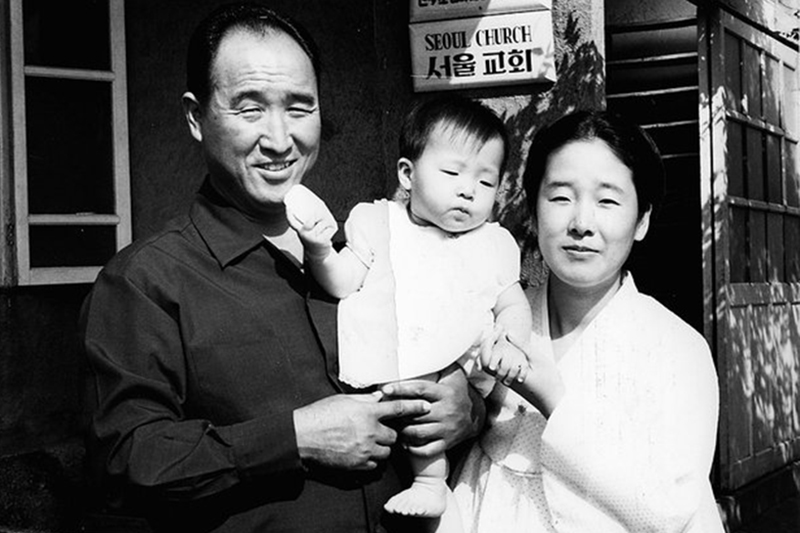A Family Legacy of Giving

“The guest room in our home was always full of people. Even people from other villages knew that if they came to our home, they could always count on being fed a good meal,” wrote Rev. Dr. Sun Myung Moon in his autobiography, As a Peace-Loving Global Citizen. “The first thing I learned after I learned to walk was how to serve food to others.”
The late Rev. Moon, who co-founded Family Federation for World Peace and Unification (FFWPU), was raised in a Christian family in what is now known as North Korea. Generations of his family clan were well regarded by their fellow villagers for their virtuous nature, devout faith and heart of giving. As July 11 marks the 1893 birth of Rev. Moon’s father, Kyung Yu Moon, we revisit a passage from his autobiography which shares treasured details and memories of his upbringing.
Below is an excerpt from the Chapter One section, “The Joy of Giving Food to Others.”
I was born at 2221 Sang-sa Ri (village), Deok-eon District, Jeong-ju Township, Pyong-an Province, as the second son of Kyung Yu Moon of the Nam Pyung Moon clan and Kyung Gye Kim of the Yeon An Kim clan. I was born on the sixth day of the first lunar month in 1920, the year after the 1919 independence movement. I was told that our family settled in the village of Sang-sa Ri during the life of my great-grandfather.
My paternal great-grandfather worked the farm himself, produced thousands of bushels of rice, and built the family fortune with his own hands. He never smoked or drank liquor, preferring instead to use that money to buy food to give to those in need. When he died, his last words were, “If you feed people from all the regions of Korea, then you will receive blessings from all those regions.” So the guest room in our home was always full of people. Even people from other villages knew that if they came to our home, they could always count on being fed a good meal. My mother carried out her role of preparing food for all those people without ever complaining…
By the time I was born and was growing up, much of the wealth that my great-grandfather had accumulated was gone, and our family had just enough to get by. The family tradition of feeding others was still alive, however, and we would feed others even if it meant there wouldn’t be enough to feed our family members.
The first thing I learned after I learned to walk was how to serve food to others.
During the Japanese occupation, many Koreans had their homes and land confiscated. As they escaped the country to Manchuria, where they hoped to build new lives for themselves, they would pass by our home on the main road that led to Seon-cheon in North Pyong-an Province. My mother would always prepare food for the passersby, who came from all parts of Korea. If a beggar came to our home asking for food and my mother didn’t react quickly enough, my grandfather would pick up his meal and take it to the beggar. Perhaps because I was born into such a family, I too have spent much of my life feeding people. To me, giving people food is the most precious work. When I am eating and I see someone who has nothing to eat, it pains my heart and I cannot continue eating…
The village mill was next to our house. The four walls of the millhouse were well built, so that the crushed rice could not fall through the cracks. This meant that in the winter it was a good place to escape the wind and stay warm. If someone took some kindling from our home’s furnace and started a small fire in the millhouse, it became warmer than an ondol-heated room. Some of the beggars who would travel around the country would decide to spend the winter in that millhouse. I was fascinated by the stories they had to tell about the world outside, and I found myself spending time with them every chance I got. My mother would bring my meals to the millhouse, and she would always bring enough for my beggar friends to eat as well. We would eat from the same dishes and share the same blankets at night. This is how I spent the winter.
When spring came, they would leave for faraway places, and I could not wait for winter to come again so they would return to our home. Just because their bodies were poorly clothed did not mean that their hearts were ragged as well. They had a deep and warm love that showed. I gave them food, and they shared their love with me. The deep friendship and warmth they showed me back then continue to be a source of strength for me today. As I go around the world and witness children suffering from hunger, I am always reminded of how my family never missed a chance to share food with others.
You can get a copy of Rev. Moon’s autobiography here.
Comments are welcomed and encouraged on this site, but there are some instances where comments will be edited or deleted. Please see our comments policy here.

Julian Gray
| #
For more on Father’s early life it might interest readers to know that on the International HQ Mission Support Website (familyfedihq.org) we are running “Father’s Life in His Own Words” – a series that draws on Father’s speeches given over many decades and puts the content into (more or less) chronological order.
Reply